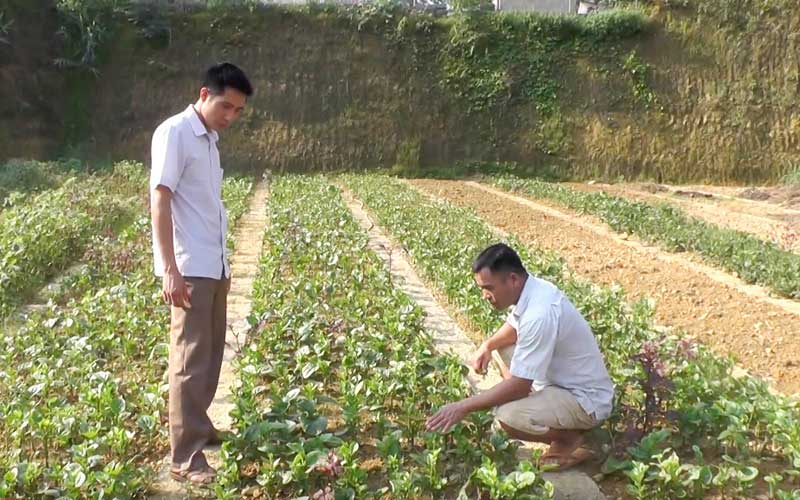
Being the first commune of Da Bac district coming to the new rural destination, the appearance of the new countryside in Tu Ly commune has been dramatically changing. By the end of 2018, the average income of the commune reached 29 million VND a person, the poverty rate decreased to 11%, the rate of people using electricity and water reached 100%, there was no temporary or dilapidated houses in the area.
Mr. Ban Van Binh, the Vice Chairman of the People's Committee of Tu Ly commune says "Before implementing the program to build new rural areas, Tu Ly was a poor commune. The average income is only 10 million VND a person every year. The rate of poor households accounted for more than 50% and the people's lives still face many difficulties and shortages.”
 Mr. Xa Ky Dong in Tinh hamlet, Tu Ly commune (Da Bac) has been effectively developing a model of growing vegetables with a profit of over 200 million VND a year, contributing to promoting the local socio-economic development.
Mr. Xa Ky Dong in Tinh hamlet, Tu Ly commune (Da Bac) has been effectively developing a model of growing vegetables with a profit of over 200 million VND a year, contributing to promoting the local socio-economic development.
Determining new rural areas is a political task, contributing to changing the face of the rural areas, creating favorable conditions for people to improve their incomes and their quality of life. Therefore, immediately after implementing the program, the Party Committee and the appropriate authorities have promoted the propaganda about the importance of the program for the new rural construction.
Thereby, they have been actively creating and exploring the new economic models with high income. They have been mobilizing people to donate the land, contribute the working days to expand traffic roads and repair the essential infrastructure systems. In the period from 2011 to 2018, the total mobilized capital from the locality reached 180 billion VND. In which, the capital from the State is 72 billion dongs, the capital integrated from the programs and projects is 56 billion dongs, the credit capital is 34 billion dongs. They have mobilized the local people to contribute 7 billion VND and donate 27,000 m2 of all kinds of land, 2,100 working days to build, repair the cultural houses of the hamlets and expand rural roads.
In the coming time, the Party Committee and authorities of the commune want to be provided more funding to improve the quality of the achieved criteria from the State. In addition, they have been actively propagating and mobilizing people to be active, creative and effective in promoting the economic models with high income. They suggest that the local people continue to donate the land and contribute the working days to build and improve the quality of the essential infrastructure works. Thereby the quality of life can be improved, promoting the local socio-economic development. At the same time, a "breakthrough" can be created for the communes of Da Bac district to prepare for the new rural destination.
The emulation movement "Hoa Binh joining hands to build new-style rural areas” has been widely spreading, becoming a driving force that motivates the localities to renew rural landscapes and improve the material and spiritual lives of the residents. In this movement, the people play a central role-both as the main implementers and direct beneficiaries of its outcomes.
In response to the global digital revolution, Hoa Binh Newspaper is transforming itself into a modern and multi-platform media hub, blending cutting-edge technology with a restructured newsroom and a new generation of tech-savvy journalists.
Hoa Binh province’s Association of the Elderly recently held a conference to review the project on expanding the inter-generation self-help club model until 2025.
In a move to implement Resolution No. 57-NQ/TW, issued on December 22, 2024 by the Politburo, which targets breakthroughs in science-technology development, innovation, and digital transformation, the Hoa Binh provincial Department of Health has issued a plan to roll out the "Digital Literacy for All” campaign within the local health sector.
An Nghia Commune (Lạc Sơn District) is one of the communes that achieved the tha standard of the national new rural area in 2018. Entering a new development phase, the commune is now trying to meet the criteria for the advanced new rural development. With the strong political will and the public consensus, the commune is gradually overcoming the challenges to reach this goal, aiming for the sustainable development.



 Mr. Xa Ky Dong in Tinh hamlet, Tu Ly commune (Da Bac) has been effectively developing a model of growing vegetables with a profit of over 200 million VND a year, contributing to promoting the local socio-economic development.
Mr. Xa Ky Dong in Tinh hamlet, Tu Ly commune (Da Bac) has been effectively developing a model of growing vegetables with a profit of over 200 million VND a year, contributing to promoting the local socio-economic development.